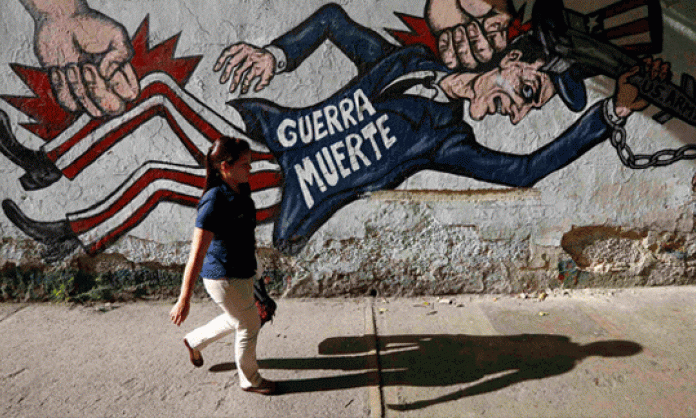United States president Barrack Obama signed a new executive order on 9 March declaring “a national emergency with respect to the unusual and extraordinary threat to the national security and foreign policy of the United States posed by the situation in Venezuela”.
The order escalates US aggression against Venezuela to a level not seen since the April 2002 coup. At that time, the United States, together with the domestic right wing opposition, staged a coup that was defeated within 48 hours by a people’s uprising in alliance with pro-government military units.
The executive order places Venezuela on the same level as Iran, Syria and North Korea. It provides the US president the authority to launch military action at any time.
Nine Venezuelan government officials have been targeted in response to the recent arrests by Venezuelan authorities of people who were planning aggression against the government.
Obama said: “We will continue to work closely with others in the region to support greater political expression in Venezuela, and to encourage the Venezuelan government to live up to its shared commitment, as articulated in the OAS Charter, the Inter American Democratic Charter, and other relevant instruments related to democracy and human rights.”
Opposition in Latin America
However, the Union of South America States (UNASUR), of which Venezuela is a member, released a statement that said: “The member states of UNASUR reject the executive order approved by the United States government which declares Venezuela a threat to national security.” UNASUR also called on the United States to overturn the order.
Online news service Venezuelanalysis.com also reported that the Community of Latin American and Caribbean States had already issued a statement against the increasing aggression by the United States due to the increased sanctions that Obama had already signed into law in December 2014.
“The Community of Latin American and Caribbean States (CELAC) reiterates its strong repudiation of the application of unilateral coercive measures that are contrary to international law”, the statement said. CELAC represents every country in the hemisphere except for the US and Canada.
Venezuelan president Nicolas Maduro on 11 March requested decree powers to pass an “anti-imperialist law to prepare for all scenarios”. A key component of the decree was to order the military and the popular militias to undergo preparations to “defend the country’’.
On 14 March more than 100,000 people mobilised in central Caracas. The event was organised by the Ministry of Defence. Lucas Koerner, writing at Venezuelanalysis.com, reported: “Alongside active duty soldiers, participated members of the Bolivarian Militia, which was expanded by over 35,000 members by president Chávez in 2010. The Bolivarian Militia represents the foundation of a popular ‘civic-military alliance’.”
The following day, another mobilisation was held in support of the government. President Maduro spoke at the mobilisation, stating: “In name of the Venezuelan people, I call on all the popular movements, all of the solidarity movements, all of our sister peoples in the world, especially in Latin America and the Caribbean … to stay mobilised in order to speak the truth and demand throughout the world that president Barack Obama revoke the [executive] decree threatening Venezuela.”
Campaign by right wing
Since the election of former president Hugo Chávez in 1998, the United States has tried different avenues to attack and destroy the gains of the Bolivarian revolution.
In another article, Koerner reported that “former Caracas metropolitan mayor Antonio Ledezma was arrested last month on charges of conspiracy and sedition related to the 12 February thwarted ‘Blue Coup’ attempt. A Venezuelan judge found sufficient evidence linking the opposition figure to air force officials involved in the coup as well as to right wing terrorist leaders such as Lorent Saleh, who was extradited by Colombian authorities to face charges last year.
“The other high profile Venezuelan opposition leader currently facing trial is Leopoldo López, who was indicted for his role in leading several months of violent opposition protests last year with the aim of affecting the ‘exit’ … of the constitutional government”, Koerner continued.
Ledezma and Lopez, together with Maria Corina Machado, were part of the attempted coup against Chávez in 2002. All three also signed the “National Transition Agreement” days before unrest in February this year. The purpose of the agreement was to call for an alternative government and encourage yet another coup.
Professor and writer James Petras provides some insights into why Obama has taken this road – namely that all other attempts to discredit or overthrow the Bolivarian revolutionary process have failed.
Petras argued on 15 March that, after the US-backed candidate failed to win the 2013 presidential election, “Obama attempted to boycott and discredit the Venezuelan voting process via an international smear campaign. The White House boycott lasted 6 months and received no support in Latin America, or from the European Union, since scores of international election observers, ranging from former president James Carter to representatives of the Organization of American States certified the outcome.
“In 2014, the Obama regime backed violent large-scale riots, which left 43 persons dead and scores wounded, (most victims were pro-government civilians and law enforcement officers) and millions of dollars in damages to public and private property, including power plants and clinics.
“Scores of vandals and right wing terrorists were arrested, including Harvard-educated terrorist Leopoldo Lopez. However, the Maduro government released most of the saboteurs in a gesture of reconciliation”, he wrote.
National Assembly elections are due later in the year. It is clear that the United States and the right wing opposition are planning to create further uncertainty and political and economic destabilisation such as was carried out in Chile against Salvador Allende in the early 1970s.
In response, the Bolivarian process has once again mobilised in defence of the political, social and economic gains that have been achieved since 1998. Due to a strong alliance between the working class and the pro-revolutionary sectors of the army and the popular militias, any US military aggression will be difficult not only to justify but also to implement.










